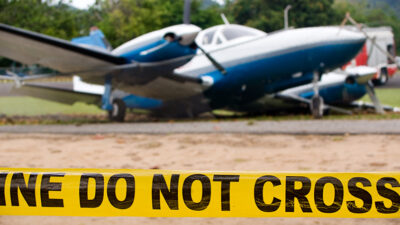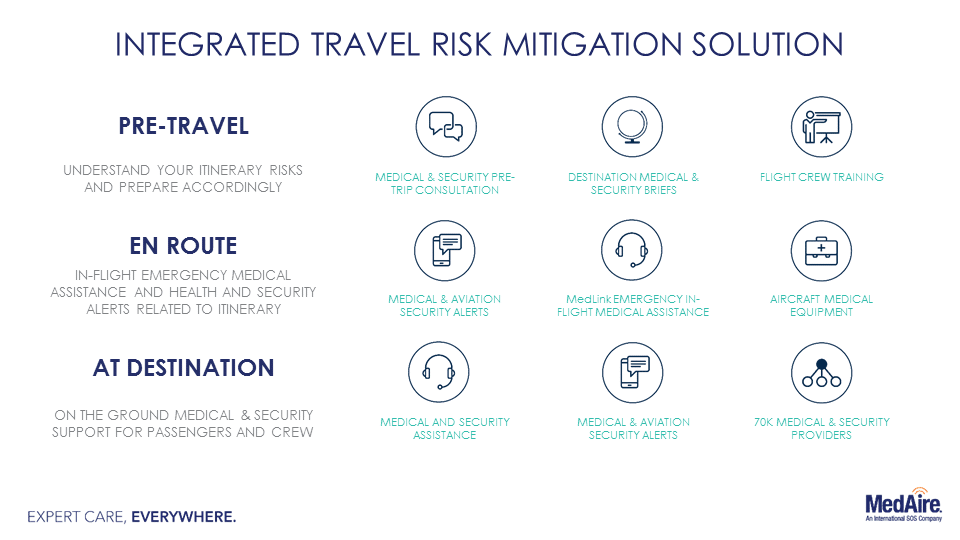Aviation Travel Risk Management

Recent high-profile events have raised a lot of questions regarding travel safety. The downing of Ukrainian International Airlines Flight PS752 and the outbreak of the novel coronavirus have raised concerns for those who travel and operate in those regions. In today’s volatile environment, an integrated travel risk management solution is both a business imperative and a best practice.
Travel risk management is a comprehensive, consistent and proactive approach to protecting your people and your operation from travel risks. It is not just linked to how well your organization can respond to a crisis—but also how well it can help prevent a crisis from happening in the first place.
Risk mitigation starts when you book your trip and ends when you and your crew are safely back at home. The best way to think about it is to focus on the three points of intervention:
- Pre-travel: Crew training, operational security information and intelligence, understanding itinerary risks and preparing accordingly
- In flight: Emergency medical and lifesaving equipment, ground-based medical assistance and health and security alerts related to itinerary
- At destination: On-the-ground medical and security support for passengers and crew while traveling.
Duty of care is the legal and moral obligation companies have to take responsibility for the safety and protection of their employees, crew, guests and travelers. Liability issues are less likely when companies have solid programs in place that put best practice travel risk mitigation measures in place.
Incorporating a travel risk management program will help mitigate risks before they become problems, and provide a plan, resources and contingencies that enable a rapid response when an issue or emergency does happen.
These measures lower the risk of any impact to operations. The cost of the canceled trip, bad PR or business continuity issues from just one event can have a financial impact that is ten times the cost of putting a program in place.
Best practices for travel risk management include the following:
- Process for assessing risks to your crew, passengers and assets—including overflight of higher-risk airspace
- Destination-specific pre-travel briefings including airport information, entry and exit requirements, transportation, hotels, crime, social and political unrest, medical and security risks, vaccination requirements and other local information important to the traveler’s safety
- Fully developed flight or operations approval process that includes a comprehensive risk assessment
- Response plans incorporated into your SMS to address any unplanned inflight emergency, natural disaster, terrorist attack or AOG
- Appropriate medical kits and lifesaving equipment aboard to manage both common medical incidents and life-threatening events for the broadest demographic of prospective passengers
- Regularly scheduled crew training—personal travel safety training as well as first responder medical care in the inflight environment
- Resources to help crew manage any inflight medical incident or emergency, including ground logistics and diversion advice
- Regularly scheduled drills to test emergency response plans, procedures and onboard equipment for effectiveness and to ensure that the team is prepared with the right training and resources
- Educate crew and passengers about the resources they have available while traveling away from home, including what to do in the event of an emergency such as a natural disaster, terrorist incident, or for any non-emergency medical or security assistance or support
- Process for identifying reliable healthcare or security providers to assist with any emergencies or unplanned incidents while traveling
- Develop a plan for managing acute fitness-for-duty issues for pilots and crew
MedAire provides comprehensive travel risk management solutions for the aviation industry. If you have questions about best practices or would like more information about how our solutions may be a fit for your operation, please contact Kara O’Connell, VP Marketing, MedAire.

Flight departments around the world rely on MedAire, an International SOS company, to reduce their travel safety risks. Crews are trained on the resources to manage in-flight illness and injury with onboard medical equipment and telemedicine assistance. On the ground, passengers and crew have one resource for medical referrals; guaranteed payments for medical expenses; assistance with lost documents and prescriptions; online and e-mail travel advisories; evacuation support and a host of other services.
http://www.medaire.com/
© 2024 MedAire, Inc.. All Rights Reserved.
Next ArticleRelated Posts

Fatal Accidents and Personal Effects: Why Expert Handling Is Essential
The devastating consequences of fatal aviation accidents cannot be overstated. An organization relies on its Emergency Response Plan (ERP) to navigate such a tragedy.

Understanding the Challenge of Turbulence-Related Injuries in Business Aviation
The challenge of managing air turbulence in business and private aviation is becoming increasingly evident due to the growing number of turbulence-related incidents affecting aircraft operators across the industry.


